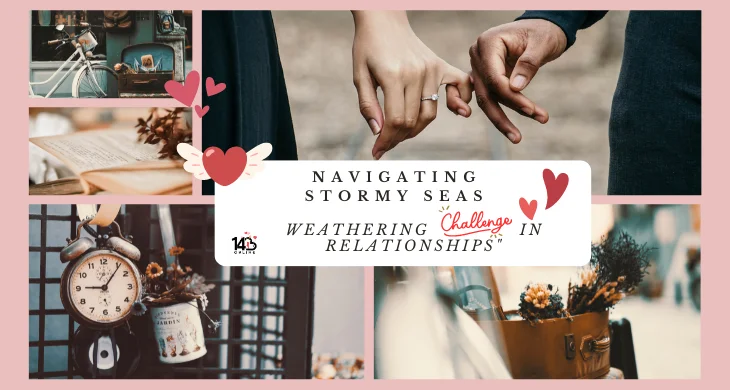Open Communication
Open communication forms the bedrock of healthy relationships, especially in tumultuous times. By honestly sharing emotions, worries, and aspirations, partners prevent misunderstandings that can fuel conflicts. Transparent dialogue creates a safe space for addressing concerns and setting expectations, fostering mutual understanding. It empowers both individuals to actively listen, empathize, and collaboratively find solutions. This practice not only reinforces emotional bonds but also promotes trust and respect. In the tempest of challenges, open communication acts as a guiding light, steering relationships towards calmer waters and ensuring that both partners weather storms hand in hand.
Active Listening
Active listening is a lifeline when navigating relationship challenges. Engaging in active listening means giving your partner your full attention, without interruption or judgment, to truly grasp their perspective. This compassionate approach nurtures empathy and validates their emotions, signaling that their feelings matter. By acknowledging their point of view, you validate their experiences and create an atmosphere of trust. Active listening enables partners to connect on a deeper level, bridging gaps and reducing conflicts. It’s a bridge that carries understanding, empathy, and support, reinforcing the foundation of your relationship as you confront the storms together.
Conflict Resolution
Conflict resolution is a crucial skill for weathering relationship challenges. Approaching conflicts without blame creates an environment where issues can be addressed constructively. Instead of striving to “win” arguments, concentrate on collaborative problem-solving. This approach shifts the focus from assigning fault to finding practical solutions that benefit both partners. Active listening, empathy, and compromise are central to this process. When conflicts arise, engage in respectful discussions, acknowledge each other’s emotions, and work together to identify compromises that strengthen the relationship. By nurturing a climate of understanding, you can steer your relationship through even the stormiest seas.
Empathy and Understanding
Empathy and understanding are vital for navigating relationship challenges. By stepping into your partner’s shoes, you gain insight into their emotions and perspectives. This fosters a stronger connection by showing that you genuinely care about their feelings. When you approach issues with empathy, it becomes easier to communicate effectively and find common ground. Instead of viewing disagreements as battles, you work together to find solutions that acknowledge both viewpoints. This empathetic approach not only resolves immediate conflicts but also strengthens the bond between you and your partner, helping you weather challenges with mutual respect and care.
Quality Time
Quality time is a cornerstone of resilient relationships. Carving out moments to share meaningful experiences and activities fosters a deep emotional connection. Whether it’s engaging in hobbies, exploring new places, or simply having heartfelt conversations, this dedicated time strengthens your bond and builds shared memories. Quality time shows your commitment to the relationship and creates a safe space for vulnerability. By investing in these moments, you prioritize each other’s presence and ensure that the challenges you face are met with a foundation of shared happiness and understanding.
Respect Boundaries
Respecting boundaries is essential for maintaining a healthy relationship. Recognize and honor each other’s individual needs for personal space, privacy, and independence. Allowing room for growth and self-expression promotes a sense of autonomy and prevents feelings of suffocation. By understanding and communicating about these boundaries, you establish a foundation of trust and mutual respect. This not only nurtures each person’s well-being but also strengthens the relationship by creating an environment where both partners can flourish and develop their identities while remaining connected through understanding and support.
Patience
Practicing patience is crucial in maintaining healthy relationships, especially when facing difficulties. Recognize that personal and relational growth is a gradual process, and setbacks are a natural part of the journey. Cultivate understanding that challenges can be opportunities for learning and strengthening your bond. By demonstrating patience, you create a supportive environment where both partners can navigate through challenges without undue pressure. This approach allows for mutual growth, resilience, and the development of a deeper connection that comes from weathering storms together. Remember that patience not only enhances your relationship but also enriches your personal growth and emotional maturity.
FAQ’s
Q1: What are some common challenges couples face in relationships?
Common challenges include communication issues, trust issues, differences in values or goals, and managing conflicts.
Q2: How can open communication improve a relationship during challenging times?
Open communication allows partners to express their feelings and concerns, leading to better understanding and resolution of issues.
Q3: What is active listening, and why is it important in relationships?
Active listening involves giving full attention to your partner when they speak, showing empathy and understanding, which fosters a deeper connection.
Q4: How can couples effectively resolve conflicts without damaging the relationship?
Address conflicts with a solution-focused approach rather than trying to win an argument. Avoid blaming and seek mutually acceptable resolutions.
Q5: How does empathy contribute to navigating challenges in relationships?
Empathy allows partners to understand each other’s feelings and viewpoints, promoting a stronger bond and facilitating effective problem-solving.
Q6: Why is spending quality time together important for couples facing challenges?
Quality time fosters a deeper connection and allows couples to share experiences, build positive memories, and reaffirm their bond.
Conclusion
In the journey of love, challenges are inevitable. Navigating stormy seas in relationships requires dedication, understanding, and effort from both partners. By fostering open communication, active listening, empathy, and patience, couples can weather the challenges that arise. Quality time, respect for boundaries, and a commitment to resolving conflicts with a solution-oriented mindset contribute to the strength of the bond. Remember, challenges can be opportunities for growth and learning, ultimately leading to a deeper, more resilient connection. With these tools in hand, couples can navigate the storms together, emerging stronger and more connected on the other side.

